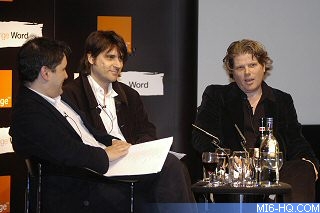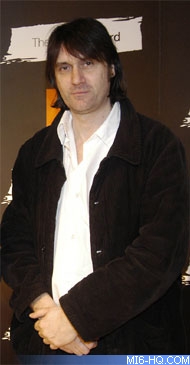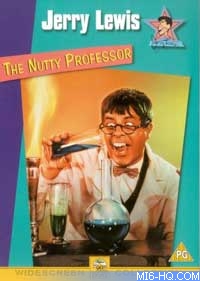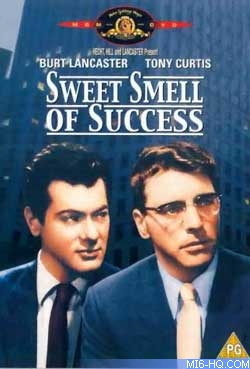 |
| |
MI6 got to attend "The Orange Word" Screen
Writers Season 2004, and can bring you the full
transcript
from the interview. In this in depth talk Neal
Purvis and Robert Wade discuss Bond, their careers,
loves
and pet hates of film...
|
|
Interview - Neal Purvis and Robert Wade (Part
1)
17th March 2004
MI6 got to attend "The Orange Word" Screen Writers
Season 2004, and can bring you the full transcript from the
interview.
In this in depth talk Neal Purvis and Robert Wade discuss
Bond, their careers, loves and pets hates of film...
Good evening to you and welcome Neal Purvis
and Rob Wade...
Peter Florence (Chair): These two have been writing
together and we've counted 31 films together. They are possibly
one of the most successful writing partnerships currently
working in the cinema.
You will probably know them from the
film with which they started their incredibly successful
screen career, Let him have it, which we're going to
show a clip of in a minute, but before doing that I'd just
like
to ask you both the obvious question of how you met. |
|

Left to right: Peter Florence, Neal
Purvis, Robert Wade. |
Neal Purvis: Rob...
Robert Wade: Well we were students at the University
of Kent and both of us had applied to live out and...
Neal Purvis: … and if you had to live in would
you be prepared to share…
Robert Wade: … and we both said no and so we found
ourselves in these bunk beds, which were the only, I think there
were four bunk beds in the whole university so they were quite
sought after and neither of us wanted to be in them but …
Neal Purvis: … so you get to know someone quite
well when you're in a bunk bed.
Peter Florence: And were you writing together?
|
Neal Purvis: Eh no, no …
Robert Wade: We were close together but not 'right-in'
together. Yeah but eh you left very quickly didn't you?
Neal Purvis: Yes, I wasn't happy with that situation
and I went and did a film and photographic BA at what was
the Polytechnic of Central London and is now a University
of some sort.
|
|

'… so you
get to know someone quite well when you're in a bunk
bed.'
|
Robert Wade: And I was doing a film theory degree which
was, you know, very theoretical and I watched …
Neal Purvis: You're an expert of pre-1905?
Robert Wade: No, 1906 actually. Pre-1906 cinema and
so that was completely useful and … but we formed a band
when we were in that bunk bed and then we added a drummer.
Peter Florence: Who slept where?
Robert Wade: Well I think I was on top most of the time.
Neal Purvis: I thought we switched quite a lot actually
but um, yeah and it was the music really that kept us together.
Peter Florence: When did you start writing down things
that were either for music or for comedy or for screen?
Robert Wade: What you mean sort of attempting to write...
Peter Florence: Attempting to tell stories.
Robert Wade: Well the band wasn't going very well and
I sort of started to write a script and it was actually 20 years
ago that Neal, I actually remember where we were when we decided
to sort of re-write together because it was the night that Tommy
Cooper died.

Above: Neal Purvis |
|
'Well I give Rob
friendship, which is difficult, isn't it?'
Neal Purvis: I think everyone remembers where
they were when Tommy Cooper died.
Robert Wade: Well we do anyway, so it was 20 years
ago because I think these Olympics are going to be actually
the anniversary of us starting to write together.
Peter Florence: What was it or what is it that
you now feel you contribute to each other, as a partnership,
in writing terms?
Neal Purvis: Well I give Rob friendship, which
is difficult isn't it?
Robert Wade: Yes. I mean no, I get to stand next
to Neal, you know.
Neal Purvis: I think that eh, it's very difficult
writing on your own, I should imagine that's what I've learnt
from writing stuff. I mean we have never written separately
so we don't quite know what it's like but the writers that
you do meet that write on their own tend to be slightly
eh, 'bonkers' and eh…
|
'...I mean I like Moonraker,
but The Man With The Golden Gun...'
Peter Florence: And you guys aren't, clearly.
Neal Purvis: Yeah, no we don't have any problems.
Robert Wade: Well I think we'd be worse if we worked
separately. It's very difficult, the rejection and all of that.
Peter Florence: I've seen the Bond DVDs, when indeed
you can actually break into them, and I've seen the bits where
you say that you sit in cafés on either side of West London
and you email each other and you don't seem to sort of sit together
on either side of a partners desk. I mean I presume that at some
point you hunker down and talk about a story and then you go away
and do the transcription bit do you?
Robert Wade: Yes we do a thing called a 'beat sheet',
when we're starting to think of an idea for a story or whatever
we sort of spend the morning separately drinking coffee and then
we meet in the afternoons and have to have alcohol because we've
had so much coffee and within, somewhere between the second and
the third pint is a window of ideas and …
Neal Purvis: Mm, after that.
Robert Wade: … if you can write it down and read
the handwriting afterwards it might be good so we sort of work
that way when we're in the nascent stage of a project.
Peter Florence: And then what, do you both go and write
up what you think you've talked about?
Robert Wade: Yes, I think.
Peter Florence: And then compare drafts?
Neal Purvis: Mm no.
Robert Wade: Oh no what we do is we sort of … that
process goes on for a long time and eh only when we have sort
of, really think that it's quite good…
Neal Purvis: It's just putting together a structure
eh and I mean we, early on we over did it on the structure once
didn't we?
Robert Wade: Mm.
Neal Purvis: Well we did this thing of we got some bits
of paper and we wrote down the scenes as a one line thing for
each scene and then we cellotaped the bits of paper together and
it was 15ft long and something happened and it got covered in
fish so we had to bin that structure and it was probably the best
thing that ever happened.
Robert Wade: It's the only script we never finished.
Neal Purvis: Yeah that's true.
Robert Wade: So yeah when you're happy with the breakdown
of it all…
Peter Florence: Then who gets to write the first draft
of dialogue? Physically, on their computer and email it to the
other one?
Robert Wade: Well what we sort of say is you take that
bit and I'll take that bit.
Peter Florence: What different scenes?
Neal Purvis: Yeah about five pages each.
'...also got The Nutty
Professor (Jerry Lewis), which is a very good film...'
|
Robert Wade: Yes and then I re-write what Neal
did.
Neal Purvis: And I chuck away what he did.
Peter Florence: Okay, when you were in your band,
you presumably at that age …
Robert Wade: We're still in the band actually
and we still harbour hopes of getting somewhere.
Peter Florence: What you and Steven King and Matt
groaning altogether, what a dreadful thought. When you were
in the band and you were students you presumably already
had 10, 15, even 20 years of cinema lore already that was
yours, what were you loving and did you think at that time
that you wanted to write, because I read somewhere you wanted
to write for the movies and not for television and you knew
that from a very early age?
|
|

Above: The Nutty Professor (1963)
|
Neal Purvis: Well we, I mean I don't know about knowing
but I mean we really liked going to the cinema and TV tends to
borrow more from the cinema and we, we just stuck to our guns
and didn't do � I mean there's nothing wrong with writing The
Bill, but we never did any TV that came our way when we weren't
earning any money and so we just kept writing films. Then at least
people know that that's what you do, you're a film writer. The
film industry was in a terrible state when we state when we started.
Robert Wade: I think we went into the wrong business
and we should have done other things because you learn more by
actually getting something made and then seeing how bad it is.
Unfortunately, you know, it's difficult to get things made in
the cinema so you don't learn very much until it's too late.
Peter Florence: Turn it around and tell me what your great aspirations were towards; what are the movies that you've most admired and why?
Robert Wade: I mean I always liked Westerns and their ability to tell stories that were about something else but within a kind of a genre�
Neal Purvis: �a Star Trek.
Robert Wade: Yes and but so I suppose that's what I've always aspired to and unfortunately we haven't managed to make a Western yet, or even write one but. It's a dead genre.
Neal Purvis: I thought you were going to say Withnail and I.
Robert Wade: Well no but that's a movie that I really
love but that wasn't a film that made me want to write movies.
I think probably It's a Wonderful Life was a film that I thought
was incredibly powerful emotionally and very clever and made me
feel good so that was an inspiration.
Neal Purvis: BBC 2 used to show some good foreign films when we were about 15 �
Robert Wade: Yep

Above: Sweet Smell of Success (1957) |
|
'BBC 2 used to
show some good foreign films when we were about 15'
Neal Purvis: � and there was someone called Bertram
Blier who was very good, who did Les Valseuses and
there was (I'm going to come onto lighter things in a second)
La Grande Bouffe
Robert Wade: Marco Ferreri
Neal Purvis: That's right, but then you've also
got The Nutty Professor (Jerry Lewis), which is a very good
film and actually Grease is a very good film, but I liked
Sweet Smell of Success probably most of all.
Peter Florence: We've got a clip from that. Would
you like, between you, as I now discover that your sentences
are formed, to introduce what it is we're going to see and
why you wanted to show it?
Robert Wade: Neal?
|
Neal Purvis: Well this is, it's about 20 minutes into
the film and you haven't seen J.J. Hunsecker (played by Burt
Lancaster) who's this top gossip columnist in New York and Tony
Curtis is in a lot of trouble and you don't you know why and
he's a film publicist and you don't really understand what that
job is and it's just when they first meet.
Peter Florence: Okay, can we see the clip?
[Clip of Sweet Smell of Success shown] Click
to see the trailer
Peter Florence: It's fantastic dialogue isn't it?
Neal Purvis: Well I think that that, you know there's
respect for the 'word' in that film, which you don't get quite
as much nowadays.
Robert Wade: No. I mean you know, it's amazing you've
got this rococo dialogue and it's very false but it works in terms
of a movie and also that scene is giving you this sort of exposition
about what a press agent is and everything but it's all dressed
up within the dynamics of the characters so it's…
Neal Purvis: And for it's day, that little camera movement
that he does, this one's touting this one is like a Scorsese thing.
I think it's like Shakespeare that film.
Robert Wade: The whole film is like that. You could take any sort of four minute clip, but you can't really take any less than four minutes.
Related Articles:
 Interview - Neal Purvis
and Robert Wade (Part 2)
Interview - Neal Purvis
and Robert Wade (Part 2)
 Interview - Neal Purvis
and Robert Wade (Part 3)
Interview - Neal Purvis
and Robert Wade (Part 3)
 Interview - Neal Purvis
and Robert Wade (Part 4)
Interview - Neal Purvis
and Robert Wade (Part 4)
 Interview - Neal Purvis
and Robert Wade (Part 5)
Interview - Neal Purvis
and Robert Wade (Part 5)
 MI6 "The World is Not Enough"
Coverage
MI6 "The World is Not Enough"
Coverage
 MI6 "Die Another Day" Coverage
MI6 "Die Another Day" Coverage
Many thanks to Peter Florence, Neal Purvis,
Robert Wade, Ellie Ward, The
Orange Word and The
British Library. Transcript courtesy The Orange Word. Image
courtesy Amazon Associates and The Orange Word